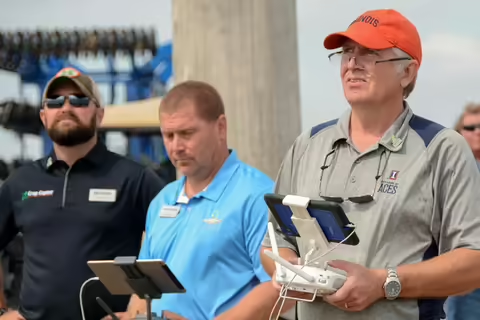URBANA, Ill. – Agriculture’s one big thing, according to Dennis Bowman, is this: feeding the world sustainably in the face of climate change.
Ag has always been a complicated business, a mix of biology, geology, and weather influenced by ever-changing economics, politics, and public opinion.
“One of the things we’re looking at right now is how we can use artificial intelligence to manage the changing conditions in production agriculture,” says Bowman. “Ag has always looked forward to the next technology advancement. We want to ensure it serves the people who rely on it daily.”
Bowman has always been an early adopter and adapter of technology, transforming science-based knowledge into practical application for farmers.
While studying ag science at Western Illinois University in the early 1980s, he was challenged in a one-credit course to figure out how computers might benefit farmers. With inputted information from the Illinois Agronomy Handbook, Bowman wrote a program that automatically calculated fertilizer recommendations when soil test results were entered. Forty years later, Bowman is now a contributing author to the publication that started his technology journey.
For Bowman, it isn’t the technology that’s so attractive; it’s the practical application of that technology that matters.
With the introduction of precision ag technologies in the 1990s, Bowman devoted efforts to convincing farmers to trust the tiny computer technology.
“If you tell people you’re receiving signals from space that give you their exact location, they look at you strangely,” Bowman says. Profitable results eliminated the suspicion.
As an example, Bowman says a farmer who worked bottomland next to the Sangamon River once came to him for help. For three years, the field didn’t yield the expected crop. Using GPS, Bowman identified the problem impacting crop productivity, a buried sandbar that prevented the area from retaining water.
Bowman gained national attention in 2014 for his work with drones. When the technology was still in its infancy, Bowman was intrigued by the possibilities and began working on its application to the ag industry by building his own drone equipped with a camera.
“As a field agronomist, It was my responsibility to identify problems and make recommendations to farmers,” Bowman says. “Without walking a client’s entire field, I was always asking myself, ‘Am I missing something.’"
In crop production, early identification of problems leads to corrective applications that help reduce crop loss.
“Drones allow us to see problems and make adjustments earlier than before.”
Except for the few months he spent as a crop scout and field agronomist after college, Bowman has only worked for University of Illinois Extension. The life and work experiences have all contributed to Bowman’s latest gig: Extension’s new digital agriculture specialist.
Technology reshapes how Extension works within the ag community, but not Extension's longstanding mission.
“Extension will always be the unbiased adviser recommending solutions that are backed by scientific research and proven application that lead to safer practices and increased profitability,” Bowman says. Just as Extension staff guided adoption of new production practices, such as no-till farming, they continue to help farmers see benefit in new technologies.
For example, auto guidance systems for spraying and tillage are able to match return passes through the field to the inch, reducing overlap and gaps. In addition to increased efficiencies that lead to more profit, equipment operators experience less fatigue, potentially reducing incidents of accidents or risky practices.
"We are excited to have Dennis to lead Illinois Extension in the digital technology platform," says Travis Burke, assistant dean and Extension program leader for agriculture. "Artificial Intelligence, precision farming, and the tools associated with this concept, are the future of the agricultural industry."
In his new role, Bowman will ensure farmers have a voice in the research and application of new technologies at Illinois.
“I’ll be making sure researchers are asking the right questions and addressing real-world farm issues,” Bowman says.
One project involves a $10 million agrivoltaic research grant award to University of Illinois by the National Institute of Food and Agriculture Sustainable Ag. Systems. The emerging field combines agriculture and photovoltaics. Photovoltaics is the conversion of light into electricity using solar panels placed on land. Agriculture uses land for food production.
Illinois agrivoltaics researchers will be exploring ways that Illinois farmland can be used for both agriculture and photovoltaics at the same time.
“The outreach will need two-way communication,” says Bowman. “Farmers and industry experts will be part of the team, providing input to guide the research team as they discover how to optimize a shared landscape.”
Bowman will also provide outreach efforts for the Artificial Intelligence for Future Agricultural Resilience, Management, and Sustainability Institute. AIFARMS strives to increase efficiency and sustainability without additional human labor.
His work will be advanced by the decades he’s spent building relationships with commodity groups, government agencies, industry leaders, ag media, farmers, and campus researchers.
Bowman’s 40-year career began as Extension ag adviser in Macoupin County where his family lived. Since 1997, he has served in regional and state capacities, most recently completing a two-year term as interim ag and natural resources program leader. He is an Illinois 4-H alum and traveled to Poland as part of the IFYE international 4-H youth exchange program.
One may reach Bowman by email at ndbowman@illinois.edu or phone at 217-244-0851.
ABOUT EXTENSION: Illinois Extension leads public outreach for University of Illinois by translating research into action plans that allow Illinois families, businesses, and community leaders to solve problems, make informed decisions, and adapt to changes and opportunities.
SOURCE: Dennis Bowman, Illinois Extension Digital Agriculture Specialist
WRITER: Judy Mae Bingman, Illinois Extension Marketing and Communications Manager



